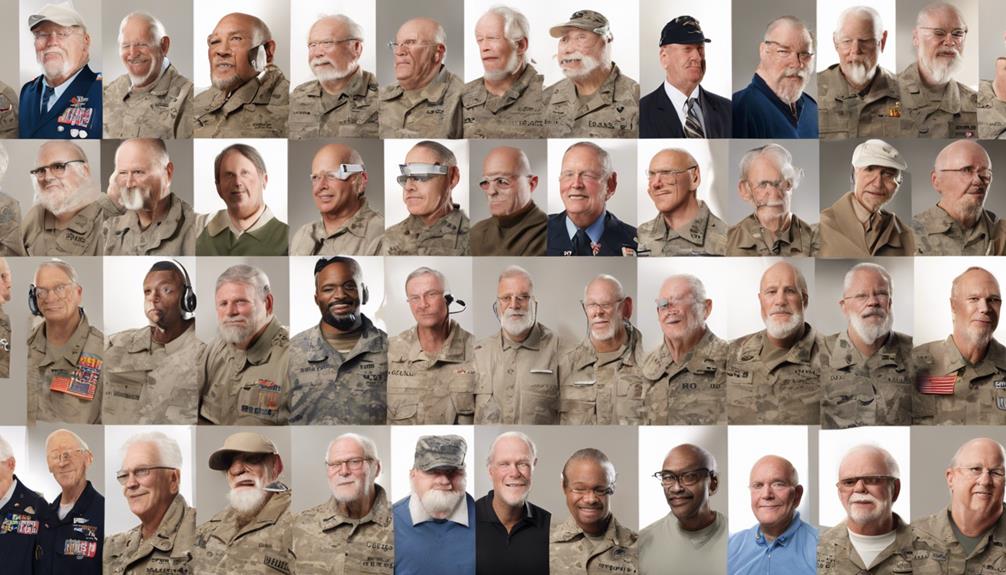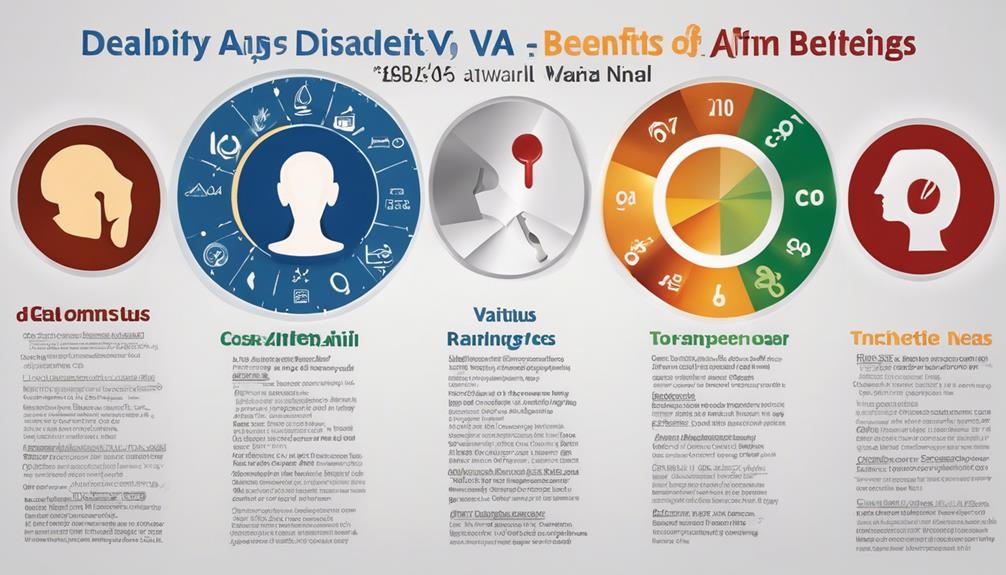Interested in learning about the different VA Disability Benefits for Hearing Loss and Tinnitus offered to veterans? Want to understand how these advantages affect the lives of our country’s service members?
Well, let's explore the comprehensive support system in place to assist veterans dealing with these service-related conditions. From eligibility criteria to compensation ratings, there's a lot to uncover about the assistance available.
So, why not join us as we delve into the details of these vital benefits and how they can make a difference in the lives of our veterans?
Key Takeaways
- Disability ratings range from 0% to 100%, reflecting severity of hearing loss.
- VA provides special monthly compensation for profound hearing loss cases.
- Tinnitus disability benefits commonly rated at 10%, impacting many veterans.
- Filing a disability claim requires establishing the link between condition and military service.
Eligibility Criteria for VA Disability Benefits
When applying for VA disability benefits for hearing loss and tinnitus, veterans must establish a clear connection between their condition and military service. To meet the eligibility criteria, veterans need to provide evidence of a current diagnosis of hearing loss or tinnitus by a licensed audiologist. This step is crucial in demonstrating the link between the disability and their time in the service. The process can be complex, but having a licensed audiologist conduct the necessary tests and documentation is a vital first step towards receiving the benefits they deserve.
Understanding the severity of the condition and its impact on daily life is essential, as it directly influences the disability ratings assigned. These ratings, ranging from 0% to 100%, determine the level of compensation a veteran will receive. While most veterans typically receive a 10% rating for tinnitus, each case is unique and evaluated individually.
Knowing the importance of meeting these criteria and having the support of a licensed audiologist can greatly assist veterans in navigating the VA disability benefits process for hearing loss and tinnitus.
Types of Hearing Loss Benefits Available

When it comes to VA disability benefits for hearing loss and tinnitus, understanding the types of compensation available is crucial.
We'll break down the specifics of hearing loss compensation and tinnitus disability benefits in a clear and concise manner.
Let's explore the various avenues through which veterans can seek support for their hearing-related conditions.
Hearing Loss Compensation
Veterans eligible for VA disability benefits may access various types of compensation for hearing loss based on the severity of their impairment. Here are some key types of hearing loss benefits available:
- Disability Ratings: The VA assigns disability ratings ranging from 0% to 100% based on the extent of hearing loss.
- Special Monthly Compensation: Veterans with profound hearing loss in both ears may qualify for additional monthly compensation.
- Service-Connected Benefits: Veterans can receive compensation for hearing loss if it's determined to be connected to their military service.
Understanding these different types of benefits can help veterans navigate the VA disability system more effectively.
Tinnitus Disability Benefits
Navigating the VA disability system for tinnitus benefits requires a thorough understanding of the available types of compensation. Tinnitus is commonly rated at 10% disability by the VA, with many veterans falling under this category. VA disability benefits specifically cater to tinnitus, encompassing symptoms like ringing, buzzing, or hissing in the ears. It is crucial to establish a service connection to secure VA compensation for tinnitus. Below is a breakdown of the types of tinnitus disability benefits available through VA compensation:
| Benefit Type | Description |
|---|---|
| Rating | Usually at 10% disability |
| Claim Filing | Can file a claim for tinnitus |
| Most Claimed | Tinnitus is the most claimed disability |
| Service Connection | Essential for receiving benefits |
Tinnitus Disability Compensation Overview
Exploring the process for obtaining tinnitus disability compensation can provide valuable insight into the support available to veterans affected by this prevalent condition. Tinnitus, a persistent ringing or buzzing in the ears, affects a significant number of veterans, with over 2.3 million veterans receiving benefits for tinnitus in fiscal year 2020.
Here are three key points to consider regarding tinnitus disability compensation:
- VA Disability Ratings: Tinnitus is commonly rated at 10% disability by the VA for compensation, with rare cases receiving ratings higher than 10%.
- Filing a Claim: Veterans experiencing tinnitus can file a claim for VA disability compensation. This process involves providing medical evidence of the tinnitus and its impact on daily life.
- Support for Veterans: Tinnitus is the number-one disability among veterans, affecting nearly 15% of American adults. The VA offers support services and compensation to help veterans manage the challenges associated with tinnitus.
Hearing Aids and Assistive Devices Coverage

Covering a range of essential services and support, VA disability benefits offer coverage for hearing aids and assistive devices to eligible individuals with hearing loss. For veterans experiencing hearing difficulties, the VA provides assistance in obtaining necessary hearing aids and assistive devices through VA healthcare services. This coverage extends to the cost of repairs and replacements for these devices, ensuring that veterans can maintain optimal hearing assistance. VA healthcare professionals are available to guide veterans in selecting the most suitable hearing aids and assistive devices that align with their specific needs.
Hearing aids and assistive devices play a crucial role in enhancing the quality of life for veterans dealing with hearing loss or tinnitus. By leveraging the support provided by VA disability benefits, veterans can access the tools necessary to improve their hearing capabilities and overall well-being. The VA is committed to assisting veterans with hearing loss by facilitating the process of obtaining and utilizing hearing aids and assistive devices, ultimately empowering them to lead fulfilling lives.
Compensation for Service-Connected Conditions

For veterans with service-connected conditions, understanding the process of compensation eligibility is crucial for accessing VA disability benefits. When dealing with service-connected hearing loss, several key factors come into play:
- Service Connection: To be eligible for compensation, it's essential to provide proof that the hearing loss is connected to military service.
- VA Disability Rating: The severity of the hearing loss determines the VA Disability Rating, which directly impacts the level of compensation received.
- Compensation: Veterans suffering from service-connected hearing loss are typically eligible for compensation to help with the challenges they face due to their condition.
Navigating the intricacies of compensation for service-connected conditions can be overwhelming, but with the right information and support, veterans can ensure they receive the benefits they deserve. By understanding the requirements for disability rating, providing evidence of service connection, and undergoing necessary hearing loss tests, veterans can strengthen their claims and improve their chances of receiving adequate compensation.
VA Disability Ratings for Hearing Loss

Understanding VA disability ratings for hearing loss is essential for veterans seeking compensation benefits related to their service-connected condition. VA disability ratings for hearing loss can range from 0% to 100%, with specific criteria determining the percentage assigned to each individual. For a 100% rating, profound hearing loss in both ears is typically necessary. However, most veterans with hearing loss receive a 10% disability rating, which is the most common rating for this condition. Here is a breakdown to help you grasp the significance of these ratings:
| Rating | Description | Criteria |
|---|---|---|
| 0% | No hearing loss | No compensation provided |
| 10% | Mild hearing loss | Difficulty hearing whispers or low sounds |
| 30% | Moderate hearing loss | Difficulty hearing normal conversation |
It's crucial for veterans to be aware of these ratings to understand the level of compensation they may be eligible for based on their hearing loss severity.
Tinnitus VA Disability Ratings Explained

As veterans navigate the complexities of VA disability ratings for hearing loss, understanding the nuances of tinnitus VA disability ratings becomes equally crucial for determining eligibility for compensation benefits. Tinnitus is typically rated at 10% disability by the VA for most veterans, with ratings based on specific criteria and test results.
Here are key points to consider regarding tinnitus VA disability ratings:
- Tinnitus ratings are usually set at 10% by the VA, but can vary based on severity.
- Veterans may receive compensation corresponding to the severity of their tinnitus disability rating.
- In rare cases, tinnitus ratings higher than 10% may be assigned by the VA.
Establishing the severity of tinnitus is paramount in determining the appropriate disability rating and the benefits a veteran may be entitled to. By recognizing the significance of tinnitus VA disability ratings, veterans can better advocate for themselves and access the support they deserve.
Secondary Service Connection Benefits

Navigating the intricacies of secondary service connection benefits can significantly impact veterans' access to compensation for conditions linked to their primary service-connected disabilities. When seeking benefits for related conditions such as mental health issues stemming from hearing loss or tinnitus, establishing a medical nexus between the primary and secondary conditions is crucial. This medical nexus acts as the bridge connecting the secondary condition to the primary service-connected disability, forming the basis for a successful claim.
Veterans pursuing compensation for secondary conditions must provide compelling evidence demonstrating the direct relationship to their primary service-connected hearing impairment. Examples of secondary conditions can include but aren't limited to anxiety and depression. Understanding the criteria and evidence required for secondary service connection is essential for maximizing VA disability benefits for related conditions.
Filing a Disability Claim for Hearing Loss

When filing a disability claim for hearing loss, it's crucial to gather the required medical evidence to support your case.
We understand the impact hearing loss can have on daily life, and documenting this can strengthen your claim.
Required Medical Evidence
Gathering essential medical evidence, including audiometric test results, is critical when filing a disability claim for hearing loss with the VA. To ensure a successful claim, veterans should provide a current diagnosis of hearing loss from a licensed audiologist.
The audiometric test results play a crucial role in determining the severity of hearing impairment. These results should include measurements of hearing thresholds at different frequencies to accurately assess the extent of hearing loss.
It's important to submit all necessary medical evidence like medical records, treatment history, and detailed statements outlining the impact of hearing loss on daily life. By compiling and presenting this evidence thoroughly, veterans can strengthen their case for VA disability benefits.
Impact on Daily Life
Transitioning from the necessary medical evidence phase to understanding the impact on daily life, veterans filing a disability claim for hearing loss with the VA must recognize the potential improvements to their quality of life through compensation. Living with hearing loss can significantly impact daily activities, communication, and overall well-being. Below is a table outlining how hearing loss can affect various aspects of daily life:
| Daily Activities | Challenges Due to Hearing Loss |
|---|---|
| Social Interactions | Difficulty Following Conversations |
| Work Environment | Struggling with Phone Calls |
| Enjoyment of Music | Inability to Hear Certain Sounds |
| Safety Awareness | Missing Important Auditory Cues |
Understanding these challenges can help veterans articulate the impact of their hearing loss when filing a VA disability claim.
Compensation Eligibility
As veterans considering filing a VA disability claim for hearing loss, understanding the eligibility criteria for compensation is crucial in navigating the benefits process effectively.
Here are some key points to keep in mind:
- Severity of Hearing Loss: The extent of hearing impairment plays a significant role in determining eligibility for compensation.
- Connection to Military Service: Establishing a direct link between your hearing loss and your time in the military is essential for a successful claim.
- VA Disability Advocates: Seeking support from VA disability advocates can greatly assist in preparing and submitting your claim accurately and efficiently.
Resources for Hearing Loss and Tinnitus Support

For individuals experiencing hearing loss and tinnitus, accessing support resources is crucial for managing their conditions effectively. Veterans facing these challenges can benefit from various avenues of assistance. The Department of Veterans Affairs (VA) offers specialized programs and services tailored to address hearing loss and tinnitus. These resources can include comprehensive evaluations, treatment options, and counseling to help veterans cope with these conditions. Additionally, support groups specifically designed for individuals dealing with hearing impairments can provide a sense of community and understanding.
Veterans seeking VA disability benefits for hearing loss or tinnitus can also turn to advocacy organizations that specialize in navigating the claims process. These advocates possess knowledge of the system and can offer guidance on filing claims, gathering necessary evidence, and appealing decisions if needed. By leveraging these resources, veterans can receive the support and assistance required to manage their hearing-related issues effectively.
Frequently Asked Questions
Can You Get VA Disability for Both Hearing Loss and Tinnitus?
Yes, you can receive VA disability benefits for both hearing loss and tinnitus if they're linked to your military service. The severity of the hearing loss determines the rating, while tinnitus is usually rated at 10% disability by the VA.
Establishing service connection is vital for receiving benefits. Filing a VA disability claim is the initial step to potentially getting compensation for both conditions.
How Much Compensation Will I Get for Hearing Loss and Tinnitus?
We understand your concern about compensation for hearing loss and tinnitus. The amount of compensation you receive can vary based on the severity of your conditions and how they impact your daily life.
It's essential to undergo the necessary tests and evaluations to determine the appropriate disability rating. Seeking assistance from VA professionals can help ensure you receive the compensation you deserve for your hearing-related disabilities.
What Type of Hearing Loss Does Tinnitus Cause?
Tinnitus can cause sensorineural hearing loss, affecting the inner ear's ability to transmit sound signals to the brain. Damage to the hair cells in the inner ear is often the root cause of the connection between tinnitus and hearing loss.
This type of hearing loss can lead to difficulties in understanding speech and processing sound, potentially worsening over time. Managing tinnitus-induced hearing loss may require comprehensive strategies to address both symptoms effectively.
What Can Be Done for Hearing Loss and Tinnitus?
When dealing with hearing loss and tinnitus, solutions can range from simple remedies like earwax removal to more advanced options like hearing aids or cochlear implants.
It's essential to address the underlying causes and seek guidance from healthcare professionals for tailored treatment plans.
Conclusion
In conclusion, VA Disability Benefits for hearing loss and tinnitus provide crucial support to veterans impacted by these service-connected disabilities.
Did you know that approximately 2.7 million veterans receive disability compensation for hearing loss and tinnitus?
These benefits play a significant role in improving the lives of those who've served our country and are experiencing hearing impairments due to their military service.
If you or a loved one are eligible, don't hesitate to explore the resources available to you.











